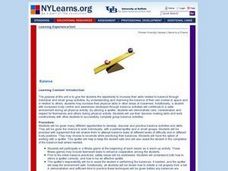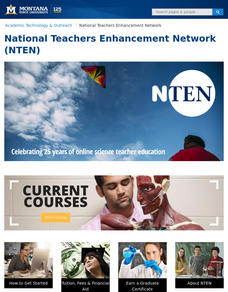Curated OER
Model Volcanoes
Students represent volcanoes with models and sketches. They research volcanoes and plan how to build a model. They, in groups, build a model volcano and cause it to erupt making observations before and after the eruption.
Curated OER
Health Related Fitness Portfolio
Students develop and implement a fitness station. Students base their exercise stations upon flexibility, muscular strength, and endurance. They complete a health related fitness portfolio. Students design and take a fitness survey.
Curated OER
Endangered Animals: Hawaii
Students locate regions in Hawaii where specific endangered animals live. They describe habitats, identify reasons why the species has become endangered, consider how a healthy environment for wildlife contributes to a healthy...
Curated OER
Battery fun
Conduct an experiment with batteries to make a simple circuit. Fifth graders read the provided information, consider the two circuits, and determine which one is complete. An electrically charged experiment suggestion is included. Tip:...
Curated OER
Balance Activities
Students, through group and individual activities, study and experiment with the concept of balance. They attempt balancing tasks at different levels of difficulty and in different body positions. They work to improve their balance.
Curated OER
Go To The Head of the Cloud
Young scholars pretend they are water droplets traveling through the water cycle. Using their text, they discover the steps in the cycle and the different paths water can take. They write a report about their journey through the water...
Foundation for Water & Energy Education
What is the Water Cycle? Activity A
Hydrologists create a concept map about how water is used and a sentence strip defining water and describing its unique properties. Small groups work together to fill a small milk carton and compute the mass of water inside. The next...
Curated OER
The Magic of Cranberries
Students research climatic and soil conditions for growing cranberries and illustrate how cranberries grow. They research how cranberries are used past and present and create an a-b-c book on cranberries.
Curated OER
Theobroma - Food of the Gods
Pupils discuss the history of cacao and its use in the production of chocolate. They analyze actual cacao pods and record their observations. Finally they create a five minute contour drawing of the cacao pod and seeds.
Curated OER
Cone Baseball
Students practice fielding and hitting skills. Using different size balls, students play t-ball. They practice hitting the ball where partners are not standing Students work together to get the batter out.
Curated OER
Should Soil Be Sterile?
Students determine if the sterilization of topsoil is beneficial to seed germination and plant growth. They grow plants alongside control groups, make and record observations of plant growth and measure plant biomass.
Curated OER
The Wonderful World of Slugs
Examine a slug? Of course, what else would a 2nd grader do with it? Pupils use clues and go on a slug hunt, read a slug story, or make a cooperative group mural of a slug's habitat. While older learners catalog slugs, go on a slug hunt,...
Curated OER
See the light
How do light and eyesight function? Read a brief passage explaining the phenomena of light and sight. Then have learners draw arrows showing how a boy in a room with a lamp would be able to see a chair. A mini-experiment suggestion is...
Curated OER
Fun Bones
Use the hokey pokey music to teach the names of some of the major bones in the human body. Circle up, put on the music, and put your right radius in. Use this in an anatomy class to spice things up a bit!
Curated OER
Where Do I Live?
Students gain a better understanding of the population of the region they live in by comparing U.S. census data on the internet.
Curated OER
Migration Activation
Students play the role of migrating birds. As a class, they simulate a migration of birds to one place and back again. They relate their habitat size and changes to their current population numbers. They discover the many dangers of...
Curated OER
Ice Cream
Open this instructional activity by giving a brief history of ice cream. Using liquid nitrogen to lower the temperature, preteens make their own confection. The accompanying activity sheet queries learners about freezing point, the...
Curated OER
Urban Ecosystems 2: Why are There Cities? A Historical Perspective
Second in a series of five lessons, this lesson encourages preteens to consider cities as urban ecosystems. First, they keep a food diary for a few days. They visit the Natrional Agricultural Statistics Service website for current data...
Curated OER
Urban Ecosystems 4: Metabolism of Urban Ecosystems
Cities are compared to living, breathing, metabolizing organisms. Fourth in a five-part series of lessons, this one focuses on the flow of materials through a city. Links to interesting websites and images make your delivery of...
Curated OER
My Favorite Animal
Students research an animal of choice and create a project. In this animal science lesson, students choose an animal living in the International Peace Park to research. Students write a paper and create a project to present to the class.
Curated OER
Basic Needs of Living Things - Lesson Two
Fourth graders study and identify the basic needs of a variety of organisms. Terrariums and aquariums are used to demonstrate what plants, animals, and fish need to stay alive. These two classic models are used to effectively convey what...
Curated OER
Basic Needs of Living Things - Lesson One
An interesting way of teaching about basic needs of different organisms awaits your fourth graders. Pupils take part in class discussions and demonstrations which should lead to a greater understanding of how to determine basic needs. As...
Curated OER
Animal Research Pamphlet
Fourth graders perform research on an animal of choice. The reading of a novel is done prior to the research in order to establish context for the instructional activity. The use of the library for research is a key skill for this...
Curated OER
Report on Desert Plant or Animal
Students are introduced to desert plants and animals. They demonstrate that the name of an organism does not always match the object. Students perform a guided internet search in order to complete a report.
Other popular searches
- 4th Grade Physical Science
- Physical Science Matter
- Elementary Physical Science
- Physical Science Projects
- Physical Science "Motion
- Physical Science Activities
- Physical Science Lessons
- Physical Science "Motion"
- 5e Physical Science Lessons
- Physical Science Space
- Physical Science Technology
- Physical Science Content

























